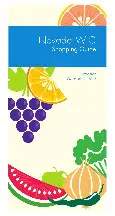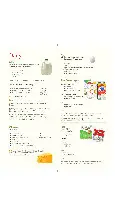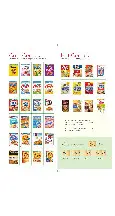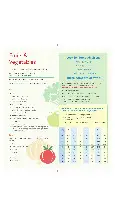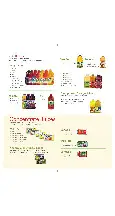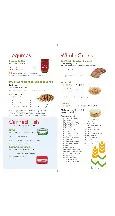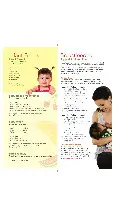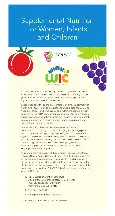Nevada WIC Approved Foods
Below is the list of Nevada WIC eligible foods based off of federal requirements. This state must use these requirements when creating the Nevada WIC food list. The following foods must comply with the FDA standards of identity:
- Infant formula
- Exempt infant formula
- Milks
- Cheese
- Fruit and vegetable juices
- Shell eggs
- Canned/frozen fruits and vegetables
- Whole wheat bread
- Canned fish
- Peanut butter
As a reminder, when going shopping at your local WIC approved grocery store, bring your WIC ID folder along with your paper checks/vouchers or if your state is using the eWIC system, bring your Nevada WIC EBT Card. You should also bring the Nevada WIC approved food list which you can view the list below or download here. This will further help you determine what items you can purchase.
If you do not see the food items you are looking to purchase with your NV WIC benefits, or if you have additional questions or issues, then we recommend you contact the Nevada WIC program for further assistance.
Nevada WIC Food List
Below is the WIC approved food list for Nevada. You can click on one of the images shown below to see the full list of items for that specific page. You can click on the left and right arrows to scroll through the available pages.
Regulatory Requirements for WIC-Eligible Foods
The following list provides the Federal requirements for WIC-eligible foods. The NV WIC program is required to authorize container sizes that provide the full maximum monthly allowance of foods without exceeding the maximum. Click a food category below to view the types and requirements for that food category.
-
Breakfast Cereal
Types of Cereal
Below is a list of the types of cereals approved:- Ready-to-eat (Ex: corn flakes, bran flakes)
- Instant and regular hot cereals (Ex: oatmeal, grits, cream of wheat)
Requirements
Below are the list of requirements for the types of cereals:- Must contain a minimum of 28 milligrams of Iron per 100 grams of dry cereal (Ex: iron = 45% U.S. RDA for adults per 1 ounce dry cereal)
- Must contain no more than 21.2 grams of sucrose and other sugars per 100 grams of dry cereal (Ex: not more than 6 grams of sucrose and other sugars per 1 dry ounce)
- At least one half of the total number of breakfast cereals on a state agency’s authorized food list must have whole grain as the primary ingredient by weight and meet FDA labeling requirements for making a health claim as a "whole grain food with moderate fat content"
-
Infant Cereal
Types of Cereal
Below is a list of the types of cereals approved:- Ready-to-eat (Ex: corn flakes, bran flakes)
- Instant and regular hot cereals (Ex: oatmeal, grits, cream of wheat)
Requirements
Below are the list of requirements for the types of cereals:- Must contain a minimum of 28 milligrams of Iron per 100 grams of dry cereal (Ex: iron = 45% U.S. RDA for adults per 1 ounce dry cereal)
- Must contain no more than 21.2 grams of sucrose and other sugars per 100 grams of dry cereal (Ex: not more than 6 grams of sucrose and other sugars per 1 dry ounce)
- At least one half of the total number of breakfast cereals on a state agency’s authorized food list must have whole grain as the primary ingredient by weight and meet FDA labeling requirements for making a health claim as a "whole grain food with moderate fat content"
-
Infant Food Fruits & Vegetables
Types/Requirements of Infant Fruits and Vegetables
Below is a list of the types and requirements of infant fruits and vegetables:- Any variety of single ingredient commercial infant food fruit without added sugars, starches, or salt (Ex: sodium). Texture may range from strained through diced. The fruit must be listed as the first ingredient
- Any variety of single ingredient commercial infant food vegetables without added sugars, starches, or salt (Ex: sodium)
- Texture may range from strained through diced. The vegetable must be listed as the first ingredient
- Combinations of single ingredients (Ex: peas-carrots and apple-banana) are allowed
Not Allowed
Mixtures with cereal or infant food desserts (Ex: peach cobbler). -
Infant Food Meat
Types/Requirements of Infant Meat
Any variety of commercial infant food meat or poultry, as a single major ingredient, with added broth or gravy. Texture may range from pureed through diced.Not Allowed
Below is a list of items not allowed:- Added sugars or salt (Ex: sodium)
- Infant food combinations (Ex: meat and vegetables) or dinners (Ex: spaghetti and meatballs)
-
Infant Formula
Types of Infant Formula
Below is a list of types of infant formulas:- Concentrated liquid
- Powdered
- Ready-to-feed (RTF)
Requirements
Below is a list of requirements:- Complies with the definition in section 201(z) of the Federal Food, Drug and Cosmetic Act (21 U.S.C. 321(z)) and meets the requirements for an infant formula under section 412 of the Federal Food, Drug Act (21 U.S.C. 350a) and regulations at 21 CFR Parts 106 and 107
- Nutritionally complete infant formula not requiring the addition of any ingredients other than water prior to being served in a liquid state
- Be designed for enteral digestion via an oral or tube feeding
- Provide at least 10 mg iron per liter (at least 1.5 mg iron/100 kilocalories) at standard dilution
- Provide at least 67 kilocalories per 100 milliliters (approximately 20 kilocalories per fluid ounce) at standard dilution
-
Exempt Infant Formula
Types of Infant Formula
Below is a list of types of infant formulas:- Concentrated liquid
- Powdered
- Ready-to-feed (RTF)
Requirements
Medical documentation required for issuance.- Complies with the definition and requirements for an exempt infant formula in section 412(h) of the Federal Food, Drug and Cosmetic Act (21 U.S.C. 350a(h)) and regulations at 21 CFR Parts 106 and 107
- Be designed for enteral digestion via an oral or tube feeding
-
Milk
Types of Cow’s Milk
Below is a list of the types of cow's milk:- Whole, reduced fat, low-fat, or nonfat
- Cultured milk
- Evaporated, Dry: Calcium-fortified milk
- Lactose-reduced and lactose-free milk
- Acidified milk
- Shelf stable
- Flavored or unflavored
Requirements
Below is the list of requirements:- Must conform to FDA standards of identity at 21 CFR Part 131.110, 21 CFR Part 131.111, 21 CFR Part 131.112, 21 CFR Part 131.127, 21 CFR Part 131.130 or 21 CFR Part 131.147
- Must be pasteurized
- Must contain 400 International Units of Vitamin D per quart (100 IU per cup)
- Must contain 2000 International Units of Vitamin A per quart (500 IU per cup) (reduced fat, low-fat or nonfat)
Please note, state agencies may choose to authorize goat’s milk as a substitute for cow’s milk. WIC-authorized goat’s milk must meet the same requirements as cow’s milk. Vitamin A is naturally found in the fat portion of milk, which is removed (all or partially) during the production of reduced-fat, low-fat, and fat-free milks. For this reason, Vitamin A fortification is required for these milks, but not whole milk. The nutrient requirement pertains to all authorized milks; for dried milk (i.e. powdered) and evaporated milk, vitamin requirements are per reconstituted quart.
-
Cheese
Types of Cheese
Below is a list of types of cheese's. Please note Blends of approved cheeses, Ex: CoJack, are authorized.- Pasteurized Processed American
- Brick
- Natural Cheddar
- Colby
- Monterey Jack
- Mozzarella: part skim or whole
- Muenster
- Provolone
- Swiss
Requirements
Below is a list of requirements:- Must conform to FDA standard of identity at 21 CFR Part 133
- Must be domestic cheese made from 100% pasteurized milk
- Cheeses that are labeled low, free, reduced, less or light in sodium, fat or cholesterol are allowed
Not Allowed
Below is a list of what is not allowed:- Cheese foods or spreads
- Imported cheeses
-
Tofu
Requirements
Below is a list of requirements:- Calcium-set tofu prepared with calcium salts (Ex: calcium sulfate), but may also contain other coagulants (Ex: magnesium chloride)
- May not contain added fats, sugars, oils or sodium
-
Soy-Based Beverage
Requirements
Below is a list of requirements:- Must be fortified to meet the following nutrient levels: 276 mg calcium per cup, 8 g protein per cup, 500 IU vitamin A per cup, 100 IU vitamin D per cup, 24 mg magnesium per cup, 222 mg phosphorus per cup, 349 mg potassium per cup, 0.44 mg riboflavin per cup, and 1.1 mcg vitamin B12 per cup, in accordance with fortification guidelines issued by FDA
- May be flavored or unflavored
-
Mature Legumes
Types of Mature Legumes
Any type of mature dry beans, peas, or lentils in dry-packaged or canned forms. Examples include but are not limited to black beans, black-eyed peas, garbanzo beans (chickpeas), great northern beans, white beans (navy and pea beans), kidney beans, mature lima beans ("butter beans"), fava and mung beans, pinto beans, soybeans, split peas, lentils and refried beans. Baked beans are only authorized for participants with limited cooking facilities.Please note, canned refers to processed food items in cans or other shelf-stable containers (Ex: jars, pouches).
Requirements
Below is a list of requirements:- May not contain added sugars, fats, oils or meat, fruit or vegetables as purchased
- Canned legumes may be regular or lower in sodium
Please note, small amounts of sugar are added to some foods that are naturally sugar-containing during the canning process to prevent stress resulting in membrane rupture (Ex: kidney beans). This small amount of added sugar is minimal and helps to maintain the quality and structure of the food. To encourage greater variety in food choices in the WIC food packages, canned legumes that contain a small amount of sugar for processing purposes, such as plain canned kidney beans, are allowed. Backed beans may have added sugars.
Not Allowed
Below is a list of what is not allowed:- Soups
- Immature varieties of legumes, such as those used in canned green peas, green beans, snap beans, yellow beans, and wax beans
- Baked beans with meat (Ex: beans and franks)
-
Peanut Butter
Types of Peanut Butter
Creamy or chunky, regular or reduced fat, salted or unsalted.Requirements
Must conform to FDA standard of identity at 21 CFR Part 164.150.Not Allowed
Below is a list of what is not allowed:- Peanut Spreads
- Peanut butter with added jelly, honey, chocolate, marshmallow or other mixtures
-
Fruits & Vegetables
Types/Requirements of Fruits and Vegetables
Please note, states must offer WIC-eligible fresh fruits and vegetables (including white potatoes) and must allow organic forms of these items; canned, frozen, and/or dried fruits and vegetables are offered at the State agency's option.Fruits
Below is a list of fruits:- Any variety of fresh (as defined by 21 CFR 101.95) whole or cut fruit without added sugars
- Any variety of canned fruits (must conform to FDA standard of identity as appropriate (21 CFR part 145)); including applesauce, juice pack or water pack without added sugars, fats, oils, or salt (Ex: sodium). The fruit must be listed as the first ingredient
- Any variety of frozen fruits without added sugars, fats, oils, or salt (Ex: sodium)
- Any type of dried fruits without added sugars, fats, oils, or salt (Ex: sodium)
- Any variety of fresh (as defined by 21 CFR 101.95) whole or cut vegetable without added sugars, fats, or oils
- Any variety of canned or frozen vegetables without added sugars, fats, or oils. Vegetable must be listed as the first ingredient. May be regular or lower in sodium. Must conform to FDA standard of identity as appropriate (21 CFR part 155)
- Any type of dried vegetable without added sugars, fats, oils, or salt (Ex: sodium)
- Any type of immature beans, peas, or lentils, fresh or in canned forms
- Any type of frozen beans (immature or mature). Beans purchased with the cash-value voucher may contain added vegetables and fruits, but may not contain added sugars, fats, oils, or meat as purchased. Canned beans, peas, or lentils may be regular or lower in sodium content
Please note, processed refers to frozen, canned, or dried. Canned refers to processed food items in cans or other shelf-stable containers (Ex: jars, pouches). Small amounts of sugar are added to some foods that are naturally sugar-containing during the canning process to prevent stress resulting in membrane rupture (Ex: sweet peas). This small amount of added sugar is minimal and helps to maintain the quality and structure of the food. To encourage greater variety in food choices in the WIC food packages, canned vegetables that contain a small amount of sugar for processing purposes, such as plain canned sweet peas and corn, are allowed.
Not Allowed
Below is a list of what is not allowed:- Herbs and spices
- Creamed vegetables or vegetables with added sauces
- Mixed vegetables containing noodles, nuts or sauce packets
- Vegetable-grain (pasta or rice) mixtures
- Fruit-nut mixtures
- Breaded vegetables
- Fruits and vegetables for purchase on salad bars
- Peanuts or other nuts
- Ornamental and decorative fruits and vegetables such as chili peppers on a string; garlic on a string
- Gourds, painted pumpkins, fruit baskets and party vegetable trays
- Decorative blossoms and flowers
- Foods containing fruits such as blueberry muffins and other baked goods
- Home-canned and home-preserved fruits and vegetables
-
Canned Fish
Types of Canned Fish
Canned only:- Light tuna, as defined by FDA in 21 CFR Part 161.190
- Salmon, as defined by FDA in 21 CFR Part 161.170
- Sardines
- Mackerel (ONLY N. Atlantic Scoumber scombrus, Chub Pacific Scomber japonicas, or Jack Mackerel)
Requirements
Below is a list of requirements:- May be packed in water or oil
- Pack may include bones or skin
- May be regular or lower in sodium content
Please note, canned refers to processed food items in cans or other shelf-stable containers, (Ex: jars, pouches). At the state agency's option, flavorings such as lemon or herbs are allowable.
-
Whole Wheat Bread and Other Whole Grains
Types of Whole Wheat Bread/Whole Grain Bread/Other Whole Grains
Below is a list of types of breads:- Whole wheat bread, buns and rolls
- Whole grain bread, buns and rolls
- Other whole grains, i.e., brown rice, bulgur, oatmeal, and whole-grain barley without added sugars, fats, oils, or salt (Ex: sodium). May be instant, quick, or regular cooking
- Soft corn or whole wheat tortillas. (Corn tortillas made from ground masa flour (corn flour) using traditional processing methods are allowed. Examples of primary ingredients meeting the WIC-eligibility criteria include: whole corn, corn (masa), whole ground corn, corn masa flour, masa harina, and white corn flour)
- Whole wheat macaroni products
Requirements
Below is a list of requirements:- Whole wheat bread must conform to FDA standard of identity at 21 CFR Part 136.180. "Whole wheat flour" and/or "bromated whole wheat flour" must be the only flours listed in the ingredient list
- Whole grain bread must conform to FDA standard of identity (21 CFR 136.110) (includes whole grain buns and rolls), and whole grain must be the primary ingredient by weight in all whole grain bread products and must meet FDA labeling requirements for making a health claim as a "whole grain food with moderate fat content"
- Whole wheat macaroni products must conform to FDA standard of identity (21 CFR 139.138) and have no added sugars, fats, oils, or salt (Ex: sodium). "Whole wheat flour" and/or "whole durum wheat flour" must be the only flours listed in the ingredient list. Other shapes and sizes that otherwise meet the FDA standard of identity for whole wheat macaroni (pasta) products (21 CFR 139.138), and have no added sugars, fats, oils, or salt (Ex: sodium), are also authorized (Ex: whole wheat rotini and whole wheat penne)
-
Juice
Juice for both women and children.
Types of Juice
Below is a list of types of juices:- Any fruit and/or vegetable juice or juice blends (e.g., orange, grapefruit, apple, grape, pineapple, tomato, cran-apple)
- Fresh
- Single-strength
- From concentrate
- Frozen
- Canned
- Shelf-stable
Requirements
Below is a list of requirements:- 100% unsweetened pasteurized fruit and/or vegetable juice
- Fruit juice must conform to FDA standard identity at 21 CFR Part 146
- Vegetable juice must conform to FDA standard of identity at 21 CFR Part 156
- Minimum of 30 milligrams of Vitamin C per 100 milliliters of juice, or 72 milligrams of Vitamin C per 8-fluid ounces (Ex: Vitamin C = 90% U.S. RDA for women per 6 fluid ounces juice)
- Vegetable juice may be regular or lower in sodium
Please note, at the state agency's option, juice fortified with other nutrients may be allowed.
Not Allowed
Below is a list of what is not allowed:- Fruit drinks
- Fruit-flavored ades
- Sodas
- Other beverages that are not 100% juice
-
Eggs
Types of Eggs/Requirements
Below is a list of types of eggs and the requirements:- Fresh shell Domestic hen's eggs: any size, white or brown shells
- Dried egg mix: must conform to FDA standard of identity at 21 CFR Part 160.105
- Pasteurized liquid whole eggs: must conform to FDA standard at 21 CFR Part 160.115
Please note, hard boiled eggs may be issued to homeless participants at the State agency's discretion.
-
WIC-eligible Nutritionals
Types of Nutritionals
Below is a list of nutritionals:- Concentrated liquid
- Powdered
- Ready-to-feed (RTF) or ready-to use (RTU)
Requirements
Medical documentation required for issuance. Below is a list of requirements:- Intended for use as an oral feeding and may not be a conventional food; formulas administered through a nasogastric tube may be substituted
- Must serve the purpose of a food, meal or diet (may be nutritionally complete or incomplete) and provide a source of calories and one or more nutrients (may be nutritionally complete or incomplete)
Not Allowed
Below is a list of what is not allowed:- Formulas used solely for the purpose of enhancing nutrient intake or managing body weight addressing picky eaters or used for a condition other than a qualifying condition (Ex: vitamin pills, weight control products)
- Medicines or drugs
- Hyperalimentation feedings (nourishment administered through a vein)
- Enzymes, herbs, or botanicals
- Oral rehydration fluids or electrolyte solutions
- Flavoring or thickening agents
- Feeding utensils or devices (Ex: feeding tubes, bags, pumps) designed to administer a WIC-eligible formula
- Sports or breakfast drinks
-
Yogurt
Requirements
Below is a list of requirements:- Must be pasteurized and conform to FDA standard of identity, whole (21 CFR 131.200), low-fat (21 CFR 131.203) or non-fat (21 CFR 131.206)
- Must contain no more than 40 g of total sugars per 1 cup yogurt
- May be plain or flavored
- Yogurts fortified with vitamin A and other nutrients are allowed at the SA's option
Not Allowed
Below is a list of what is not allowed:- Yogurts sold with accompanying mix-in ingredients such as granola, candy pieces, honey, nuts and similar ingredients
- Drinkable yogurts
Nevada WIC Food FAQ's
Does WIC help with diapers?
No. You cannot use your WIC benefits to purchase diapers. This is not about food, but a lot of people ask this question.
Are organic foods WIC eligible?
Some organic forms of WIC-eligible foods (Ex: milk, eggs, cheese) meet the nutritional requirements set forth in WIC regulations and are therefore authorized. However, the Nevada WIC program is responsible for determining the brands and types of foods to authorize on their WIC approved food lists. Some state agencies may allow organic foods on their foods lists, but this will vary.
The decision may be influenced by a number of factors such as cost, product distribution within a state, and WIC participant acceptance. Organic fruits and vegetables purchased via the WIC cash-value voucher are authorized. There are no state agency discretion to disallow them. The cashvalue voucher may be redeemed for any WIC-eligible fruit and vegetable.
How does the WIC serve participants who have food allergies/intolerances?
The Nevada WIC Program works hard to serve a large population that has various nutritional needs, including food allergies/intolerances. However, the foods eligible for the WIC food packages must meet nutritional requirements set by Federal regulations. If a participant has food allergies, the Nevada WIC staff may tailor food packages to better meet the participant's individual needs.
Types and quantities of foods in the food package may be adjusted to meet individual dietary needs. For example, if a child on the Nevada WIC program is allergic to peanut butter, dried beans/peas may be substituted for the peanut butter. If a pregnant woman on WIC is lactose-intolerant, lactose-reduced milk or soybased beverage may be substituted. If an infant on WIC has a medical condition requiring an exempt infant formula, the participant may receive such a formula with appropriate medical documentation.
Are artificial sweeteners allowed?
Federal WIC regulations do not prohibit foods that contain artificial sweeteners. However, the Nevada WIC program is responsible for determining the brands and types of foods to authorize on their WIC approved food lists. Some state agencies may allow foods sweetened with artificial sweeteners on their foods lists, but this will vary from state to state.
Can a state agency authorize only fresh fruits and vegetables?
Yes. Both fresh fruits and fresh vegetables must be authorized by state agencies. However, if the state agency chooses to only authorize fresh fruits and fresh vegetables, it must assure that such a decision would not adversely impact participants, such as situations where droughts limit availability of produce and homeless individuals who may have no ability to properly store fresh produce. The state agency must also consider the impact such a decision would have on small vendors.
Are fruit and vegetable party platters allowed?
No. A party tray is a platter of fresh fruits and/or vegetables (with or without dips) as something that is marketed as a prepared party tray, meant to be purchased and served to a group of people at a gathering or a party. Party trays are not allowed to be purchased with the cash-value voucher.
Is rice beverage WIC eligible?
Rice-based beverages are not authorized milk substitutes in the NV WIC Program. Soy-based beverages that meet the Federal WIC nutrient requirements are authorized at the state agency's option.
Are lactose-reduced and lactose-free milk allowed?
These milks are allowed at state agency option. They do not require medical documentation.
Are flavored soy-based beverages that meet the nutrient standards allowed?
Yes.
Are WIC participants able to choose the brand of infant formula for their infant?
WIC state agencies are responsible for identifying the types and brands of infant formulas that are authorized for use in their WIC Programs. The Federal regulations that govern the NV WIC Program outline the minimum requirements for WIC eligible infant formula. WIC state agencies are required to have a competitively bid, solesource rebate contract with a manufacturer of infant formulas.
Under such an agreement, most healthy WIC infants may be provided either a milk-based or soy-based iron-fortified infant formula produced by the manufacturer awarded the contract. In turn, WIC state agencies receive a rebate per can of infant formula issued to a WIC infant. Infants who have special dietary needs are provided an appropriate alternative formula, in accordance with state WIC policies and Federal regulations. WIC rebate contracts and policies vary by state, therefore the types and brands of infant formula will vary by state.
If a WIC participant has a special dietary need, what does WIC require to receive an exempt infant formula or WIC eligible nutritional?
Medical documentation is required for the issuance of exempt infant formulas and WIC eligible nutritionals. Medical documentation means a determination by a licensed health care professional authorized to write medical prescriptions under state law that the participant has a qualifying condition that dictates the use of these formulas because the use of conventional foods is precluded or restricted. WIC state agencies are responsible for using Federal WIC regulations to determine the eligibility of exempt infant formulas and WIC eligible nutritionals for their state WIC food lists.
State agencies also determine the qualifying conditions that require the use of an exempt infant formula or WIC eligible nutritionals. Only those formulas appearing on the state WIC food list may be issued to WIC participants. Please contact the Nevada WIC program to learn about the exempt infant formulas and WIC eligible nutritionals authorized on their food list, and their policy for providing non-contract brand of infant formulas to participants.
